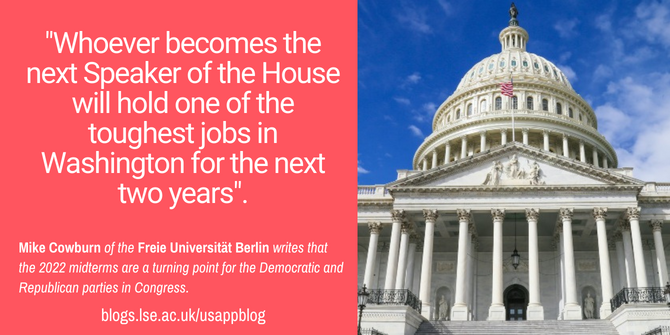 With the Democrats still in control of the US Senate following the midterm elections, the most important change to the congressional balance of power is the Republican Party’s new but slim majority in the House of Representatives. Mike Cowburn looks at what the elections could mean for the next congress, writing that the Republican Party’s leadership may struggle to manage the increasing divide between its House members, some of whom reject democratic norms. Turning to the other side of the aisle, he writes that after finding success this cycle, a new generation of Democratic leadership may be more willing to support moderate candidates and to intervene in Republican primaries.
With the Democrats still in control of the US Senate following the midterm elections, the most important change to the congressional balance of power is the Republican Party’s new but slim majority in the House of Representatives. Mike Cowburn looks at what the elections could mean for the next congress, writing that the Republican Party’s leadership may struggle to manage the increasing divide between its House members, some of whom reject democratic norms. Turning to the other side of the aisle, he writes that after finding success this cycle, a new generation of Democratic leadership may be more willing to support moderate candidates and to intervene in Republican primaries.
- Our mini-series, ‘The 2022 midterms‘, explores aspects of the midterm elections at the presidential, Senate, House of Representative and state levels, and also reflects on what the results will mean for US politics moving forward. If you are interested in contributing, please contact Rob Ledger (ledger@em.uni-frankfurt.de) or Peter Finn (p.finn@kingston.ac.uk).
As the dust settles on the 2022 midterms, the most common narrative has been that the red wave failed to materialize. Historic indicators suggested that in a midterm year with an unpopular Democratic president, high inflation, and concern about the economy, the Republican Party was well positioned to decisively take control of both the House and Senate. Instead, the red wave was restricted almost entirely to New York and Florida. Elsewhere, a combination of concerns about US democracy, the Dobbs abortion decision, and the quality of Republican candidates appear to have contributed to an election which bucked historic trends.
We now know that the Democratic Party will retain control of the Senate in the 118th Congress enabling the continued confirmation of presidential appointments, most importantly judges. The 2022 midterms saw little change in the Senate with only one state—Pennsylvania—flipping party control and all incumbents re-elected, meaning Democrats such as Joe Manchin and Kyrsten Sinema will continue to hold an outsized role. In the House of Representatives, the Republican Party will have a slim majority, placing greater focus on intra-party coordination in a party that is increasingly fractured over questions of democracy and behavioral norms. Moderates in both parties were especially likely to retire or be defeated in a primary this election cycle, likely exacerbating gridlock. The balance of power within both parties will therefore shape the contours of partisan conflict in the forthcoming Congress.
Republican Divisions Become More Important
In the Republican Party, members who voted to impeach Trump for his role in the January 6th insurrection struggled to hold their seats. Of the ten representatives who voted for impeachment, only two (David Valadao and Dan Newhouse) will remain in the 118th Congress. Though several experienced moderates either retired or were defeated in primaries, several newly elected Republicans may fill this void. In New York, districts that Biden won in places like Long Island and the Hudson Valley elected Republicans who will need to demonstrate bipartisan credentials to retain their seats beyond 2024.
Given the slim majority the party in the House, Republican Party unity will be the defining feature of party competition in the 118th Congress. Though both parties appear increasingly united in their roll-call voting, alternative measures indicate continuing intra-party divisions, especially among Republicans. Kevin McCarthy already appears to have his work cut out to become the speaker again, with members of the far-right House Freedom Caucus publicly refusing to support him.
Whoever becomes the next Speaker of the House will hold one of the toughest jobs in Washington for the next two years, managing a Republican Party whose members are increasingly diffuse in terms of agenda and their adherence to democratic norms. On the right of the party, representatives such as Marjorie Taylor-Greene seem likely to pursue an agenda which includes impeaching President Biden, conducting investigations into Hunter Biden, and ongoing election denialism. Yet, other members may perceive such an approach as increasingly disconnected from the public and as a challenge for 2024. These conflicts in Congress will take place alongside a presidential nomination contest likely dominated by media coverage of Donald Trump, with the potential to further fracture the party.

Photo by Louis Velazquez on Unsplash
The midterm results have been broadly interpreted as damaging to the Trump faction of the Republican Party. In competitive districts and states many of his endorsed candidates lost, such as in Washington’s 3rd District where Joe Kent defeated impeachment-voting incumbent Jamie Herrera Beutler in the primary, then lost to Democrat Marie Gluesenkamp Pérez. In an optimistic note for the future of US democracy, election-denying candidates in key Secretary of State races, which will play a vital role in 2024, were also defeated. In Congress, divisions between Trump and the establishment GOP have only become more visible following the emergence of election denialism and will continue in the 118th Congress.
Progressives vs. ‘Establishment’ Democrats
For the Democratic Party, 2022 saw a continuation of the progressive versus establishment narrative of the past two election cycles. Newly elected progressives—including Robert Garcia (CA-42), Summer Lee (PA-12) and Maxwell Frost (FL-10)—will further swell the ranks of the Progressive Caucus.
In previous cycles, progressives disproportionately targeted safe Democratic seats that the party could not lose in general elections. In 2022, the faction was less constrained to safe political terrain, also primarying incumbents in swing districts. In TX-28 progressive activist Jessica Cisneros narrowly lost a primary runoff against moderate incumbent Henry Cuellar. In OR-05, however, Elizabeth Warren-endorsed Jamie McLeod-Skinner defeated Kurt Schrader in the primary. Yet, in the midterms, Cuellar comfortably held off his Republican challenger, and McLeod-Skinner narrowly lost to her Republican opponent. Democrats have historically been both more willing and able to intervene in their primaries than their Republican counterparts, and results like these may make them more likely to support moderate candidates in future.
Though the Democratic Party has long been willing to engage in their own primaries, 2022 also saw a spate of interventions in Republican nomination contests, producing adverts designed to help the candidate they would prefer to face. This tactic was condemned by former leaders. In all races in which the Democratic Party intervened in the Republican primary, the Democratic candidate prevailed in the midterm elections. This outcome suggests that Democratic interference in Republican primaries will likely continue, and we may see a retaliation in kind from Republicans in 2024.
Generational Change
Finally, the 118th Congress will see generational change in Democratic House leadership following the announcement by Speaker Nancy Pelosi and Majority Leader Steny Hoyer that they will retire in 2024, and the likely succession of Hakeem Jeffries (NY-8) to the leadership. Pelosi and Hoyer have defined party leadership in Congress in the modern era for the past two decades, and the latter’s resignation letter referenced the need for a new generation to lead the party.
Please read our comments policy before commenting.
Note: This article gives the views of the author, and not the position of USAPP – American Politics and Policy, nor the London School of Economics.
Shortened URL for this post: http://bit.ly/3i96IFP






